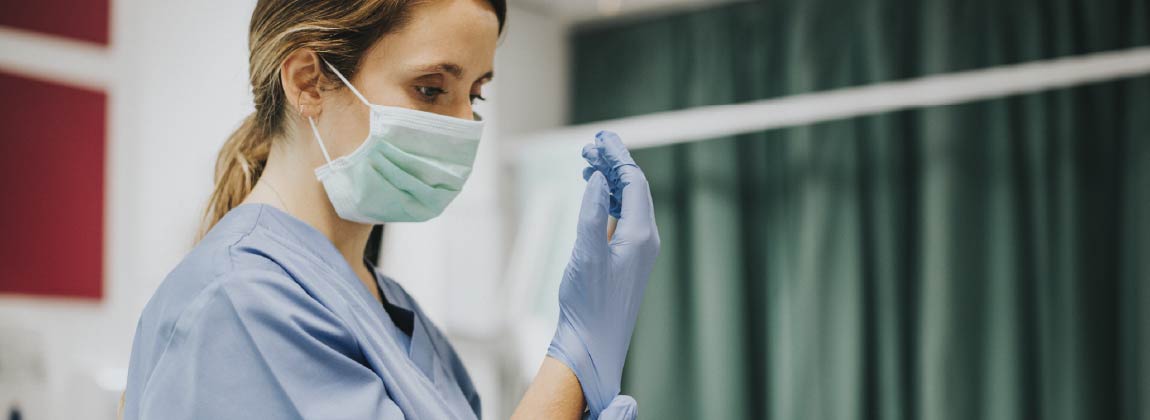COVID-19's Unequal Impact: Lessons Learned so Far + the Value of the Upstream Investment

In the early stages of the COVID-19 outbreak, statistical demographics illustrated that COVID-19 disproportionally impacted Iowans of color. Hispanic and Latino Iowans comprise 6.2% of the state's population, but in April 2020, Hispanic and Latino Iowans accounted for 16.4% of positive COVID tests. Black Iowans represent 4% of the state's population, yet in August 2020, they represented 11% of positive COVID tests.
New Initiative Focuses on Most Vulnerable
Broadlawns' president and CEO, Jody Jenner, conceptualized the framework for Healthier Together- It's a Win For All, an initiative to ensure that access to healthcare, educational information, preventive, protective equipment, testing and vaccinations was put in place for those who were left vulnerable during the pandemic.
Broadlawns approached Elizabeth Buck, president of United Way of Central Iowa, to partner on Healthier Together – It's A Win for All. They have an extensive network throughout our community and specialize in creating synergy amongst local nonprofits, businesses, elected officials and community thought leaders. After receiving funding support from the Community Foundation of Greater Des Moines' Disaster Recovery Fund and Polk County, Broadlawns and United Way of Central Iowa began working with 50+ community organizations to assess and meet needs. In just a few months, the program had distributed bilingual educational materials, 16,500 fabric masks, 11,500 individual bottles of hand sanitizer and thermometers.
Download this Win For All handout on COVID-19 resources.
Vaccinations Amoung the Most Vulnerable
As the vaccination became available, we saw inequity in its distribution. To date, 1% of vaccinations distributed in Iowa have gone to Black individuals. A recent Kaiser Family Foundation poll found that 35% of Black respondents definitely or probably would not get the vaccination.
To understand vaccination barriers and mistrust, we asked 20 Black community leaders to meet virtually. Leaders shared many ideas to build trust, including dispelling the misinformation circulating on social media and providing transparent, authentic communication.
We also heard a great deal about needing to overcome the barriers that individuals face when accessing a vaccination appointment. Community leaders shared that the digital divide is real (more about this in the future). Many individuals of color don't have hours to spend on the phone trying to schedule an appointment. We learned that vaccinations seemed to be more limited or simply unavailable at the pharmacies located within our community's urban core.
To address inequitable access to vaccinations in our community, Win for All is hosting the first COVID-19 Community Vaccination Clinic for Polk County minorities on Saturday, March 27 at Corinthian Baptist Church, a predominantly African American Church in Des Moines lead by Reverend Jonathan Whitfield. This clinic's appointments filled in less than 48 hours, thanks to the support of many community partners.
Creating a Stronger Community in Des Moines
Our vaccination clinic is not a solution to a multi-faceted problem, but it is one small step toward building a healthier community. Nationally, we have learned many lessons during this pandemic, including a clear illustration of the disparities and barriers in our community. As for healthcare systems, we have identified a few key areas that, if improved, will make our community's health stronger:
-
Invest in upstream. Health systems must do more than care for people who are sick. They must invest in addressing the social determinants of health (environments in which people are born, live, learn, work, play, worship and age) critical in shaping health outcomes.
- Provide healthcare where people are. People are struggling more now than ever. We must meet them where they are and provide compassionate care in a space that they feel comfortable. Broadlawns is piloting an innovative virtual opportunity by installing a telemedicine kiosk at Urban Dreams.
- Payment parity: Delivering healthcare with telemedicine still costs money, plus incremental costs are being incurred as infrastructure and delivery vehicles mature. To realize the benefits of telemedicine quickly, it is vital that insurance and government reimbursement for telehealth services are not discounted compared to traditional in-person visits. There will be out-of-state providers that wish to practice across state lines, and state medical licensure will be a consideration.
- Practice inclusive community conversations. Inequity begins when traditionally marginalized voices don't have a seat at the table. Community-wide issues must be solved with inclusive community conversations that are held early and often. We must be prepared to embrace ideas, emotions and views that may differ from our own.
- Strengthen the caregiving workforce that supports older adults. Few populations have been hit harder during this pandemic than our 65+ community members and those who care for them. Our older adults merit a more sound system for care.
We have to work together to build a healthy community through the delivery of accessible, cost-effective, and high quality patient care.
Reference:
1. uihc.org/news/racial-health-disparities-highlighted-covid-19
2. khn.org/news/article/poll-nearly-half-of-american-adults-now-want-the-covid-vaccine-asap
Count on the Greater Des Moines Partnership for economic recovery information and business and industry recommendations as the region moves forward from the COVID-19 pandemic. Learn more about current impacts and future trends from the DSM Forward playbooks here.
Yogesh Shah, MD, MPH
Dr. Yogesh Shah is Broadlawns Medical Center's chief medical officer and vice president of medical affairs. Dr. Shah joined the medical staff at BMC in September 2016 and practices as a geriatrician in the Broadlawns Geriatric and Memory Center. He is the founding director of the Broadlawns Palliative Care Program.